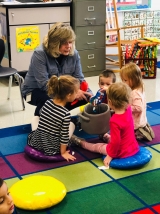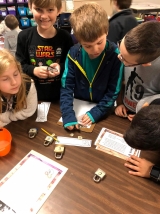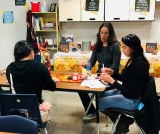-
Category 3
Selected in 2020
-
Grades: pre k - 5
School Setting: rural
Town Population: 21,240
Student Enrollment: 593
Student Demographics:
Black/African American: 8.7%
Teacher/Student Ratio: 1:21
White/Caucasian: 65.5%
Hispanic: 15.7%
Hawaiian/Pacific Islander: 0%
Asian: 0%
Native American: 0%
Other: 10.1%
% Reduced Lunch: 71%
% ELL Learners: 9%
Founded: 1922 -
PRINCIPAL:
Angie Rodgers -
CONTACT:
314 Pelzer Highway
Easley, SC 29642
864-397-2500 ext. 2510
angierodgers@pickens.k12.sc.us
West End Elementary School
Easley, SC
- Describe specific programs in place to ensure that families are involved in the success of your school and students.
- We understand the importance of being partners with parents in the education of their children and offer many opportunities for them to be involved in the success of West End. Two parent conference nights are held each year to give teachers, parents, and students time to review student progress and discuss ways to grow. We celebrate reading through a family-school reading event, West End Reads, in which all students and parents, following a reading guide, read the same book. A “Parent Involvement Nurtures Great Opportunities” (PINGO) challenge at the beginning of the year encourages family engagement on a greater level. Together, families complete educational tasks from a PINGO card and are recognized for completion. West End is a satellite site for adult learning and hosts GED classes in the evenings. Many of our parents take advantage of this opportunity to recover their education and completing this program has an impact on the educational success of their children.
- Describe the most successful activity your school has initiated to strengthen ties to your community.
- West End’s most successful activity initiated to strengthen ties in our community is our family engagement program. This program provides opportunities for parents and community members to participate in the life of West End through educational events. Planned activities are developed based on needs expressed by parents and community members through surveys. Parent Parties (workshops), offered at various times, are designed to help parents understand their children’s school day and provide information and strategies to help parents as they work with their children. Topics have included state standards; state, district, and school assessments; reading strategies; math activities; Internet safety; and remote learning. We also serve our families and community members off site at a local housing complex. Resources build relationships and parent confidence for working with children at home. Our family engagement offerings have expanded over the years and are well supported.
- What are your school’s top two goals for the next year?
- West End’s top two goals for next year are to continue to build our social emotional learning (SEL) program and recover lost learning. We recognize the importance student social-emotional health has on academic achievement. We plan to work with our teachers to provide them with strategies to build student SEL competencies. Since the closure in March 2020, our students have engaged in instruction at widely varying levels. We anticipate many of our parents who chose a virtual or homeschool option will re-enroll their children in public education once the spread of the virus is contained. Determining how best to work systematically to identify individual student strengths and weaknesses; provide focused instruction in areas of weakness; and monitor student progress will be key to filling in learning gaps.
- What is the single most important factor in the success of your school that others could replicate?
- The mindset of our faculty and staff would be a factor other schools could replicate. Our faculty and staff see the potential in every student regardless of situation, disadvantage, or struggle. This mindset, developed over the years, is based on professional development that included working with children from poverty, understanding childhood trauma, and relationship building. Our staff is service-minded and work hard to do their very best to advocate for each of our students. We work with our students to set goals - celebrating student successes and encouraging resilience when they are discouraged. Our staff “gets” the importance of developing solid relationships when working with our parents - many of whom did not have good school experiences themselves. While we work to instill perseverance, resilience, tenacity, and integrity in our students, our staff models these traits everyday in their work to ensure success for each of our students and in support of their families.
- Describe the program or initiative that has had the greatest positive effect on student achievement, including closing achievement or opportunity gaps, if applicable.
- We believe creating a master schedule in which students are strategically placed in classrooms to accommodate special services and in which we have a dedicated remediation period at each grade level has had the greatest impact on student achievement. Students are matched to classes with respect to student and teacher temperament and student instructional needs. Students with special services needs are placed in classrooms for inclusion, pull-out, or maximum support. Each grade level has a remediation period during which students with pull-out services leave the classroom while the remaining students participate in remediation activities including additional small group work with the teacher. Students who receive pull-out services do not miss new instruction, and students with demonstrated weaknesses in particular skills have additional time with teachers. The additional small group or individual student conference time with teachers effectively addresses areas for growth.
- Explain how ESEA federal funds are used to support your improvement efforts.
- West End utilizes ESEA federal funds to maintain smaller class sizes, support family engagement programming, provide assistance to families, and purchase instructional materials for students. West End employs teachers to keep class sizes at or below the district staffing standard of 21.5:1. A Title I facilitator develops our family engagement program to provide opportunities for parents to participate in workshops, celebrations, and school-wide family nights. A family liaison works with families who lack economic means and need the basics. A transition specialist works with families of preschool and kindergarten children assisting those who need extra support. An ELL teacher meets with parents of ELL students weekly to assist with communication needs. Our federal funding is also used to provide instructional materials to address identified curricular and student needs. Tutoring programs and boys’ and girls’ clubs to support at-risk students are also federally funded.
- Identify the critical professional development activities you use to improve teaching and student learning.
- Our teachers meet weekly in professional learning communities and twice a year in “Data Days” for data analysis and vertical team planning. Teachers also meet individually with our instructional coach and reading coach to analyze data and create instructional plans tailored to students’ needs with an intentional focus on our special populations. Our concentration has been data analysis, remediation, small group instruction for reading and math, conferencing with students, and strengthening our Tier I instruction. The COVID closure last spring and changes to our 2020-21 schedule have made it necessary to expand our focus to review standards for learning gaps and determine remediation and acceleration needs for each individual learner. An important focus has been to deepen our staff’s understanding of the challenges our students and families face outside the school walls through continuous professional development on best practices for engaging students and families from poverty.
- Describe how data is used to improve student achievement and inform decision making.
- To help our students reach their fullest potential, we must know them. Multiple data sources provide a full picture of our students and help determine the instructional, emotional, and behavioral needs of each child. Academically, teachers work together with our instructional coaches and administration during data days, held twice yearly, to review the results of district, state, and classroom assessments. Classroom surveys, parent conferences, attendance information, and behavioral interventions provide additional information for each student. Each student’s strengths and weaknesses are identified and reading and math groups, remediation and acceleration activities, and classroom accommodations are planned for each student. At risk students are closely monitored through Multi-Tiered Systems of Support (MTSS). Our MTSS team meets monthly to review student progress and determine next steps for student support. Formative assessments are used to monitor each student’s progress and growth.
- Describe your school culture and explain changes you’ve taken to improve it.
- West End students come from a variety of ethnicities, backgrounds, and tough situations. With this in mind and understanding the research concerning childhood trauma, we implemented a classroom meeting program to create an understanding of others and build relationships. With the closure due to COVID-19 and the resulting fear, disconnectedness, and changes to our routines, we built on our program to include a daily, intentionally scheduled morning meeting. These meetings take place whether we are in school face-to-face or learning virtually and serve as the foundation for our social-emotional learning program. Our school counselor works closely with teachers to develop and implement morning meetings using Every Child A Super Reader. Activities included in these meetings are designed to increase social interaction and belonging, build trust, encourage empathy, and build confidence. We have seen positive outcomes and social-emotional growth in our students due to our morning meetings.
Stats
-
Category 3
Selected in 2020
-
Grades: pre k - 5
School Setting: rural
Town Population: 21,240
Student Enrollment: 593
Student Demographics:
Black/African American: 8.7%
Teacher/Student Ratio: 1:21
White/Caucasian: 65.5%
Hispanic: 15.7%
Hawaiian/Pacific Islander: 0%
Asian: 0%
Native American: 0%
Other: 10.1%
% Reduced Lunch: 71%
% ELL Learners: 9%
Founded: 1922 -
PRINCIPAL:
Angie Rodgers -
CONTACT:
314 Pelzer Highway
Easley, SC 29642
864-397-2500 ext. 2510
angierodgers@pickens.k12.sc.us










